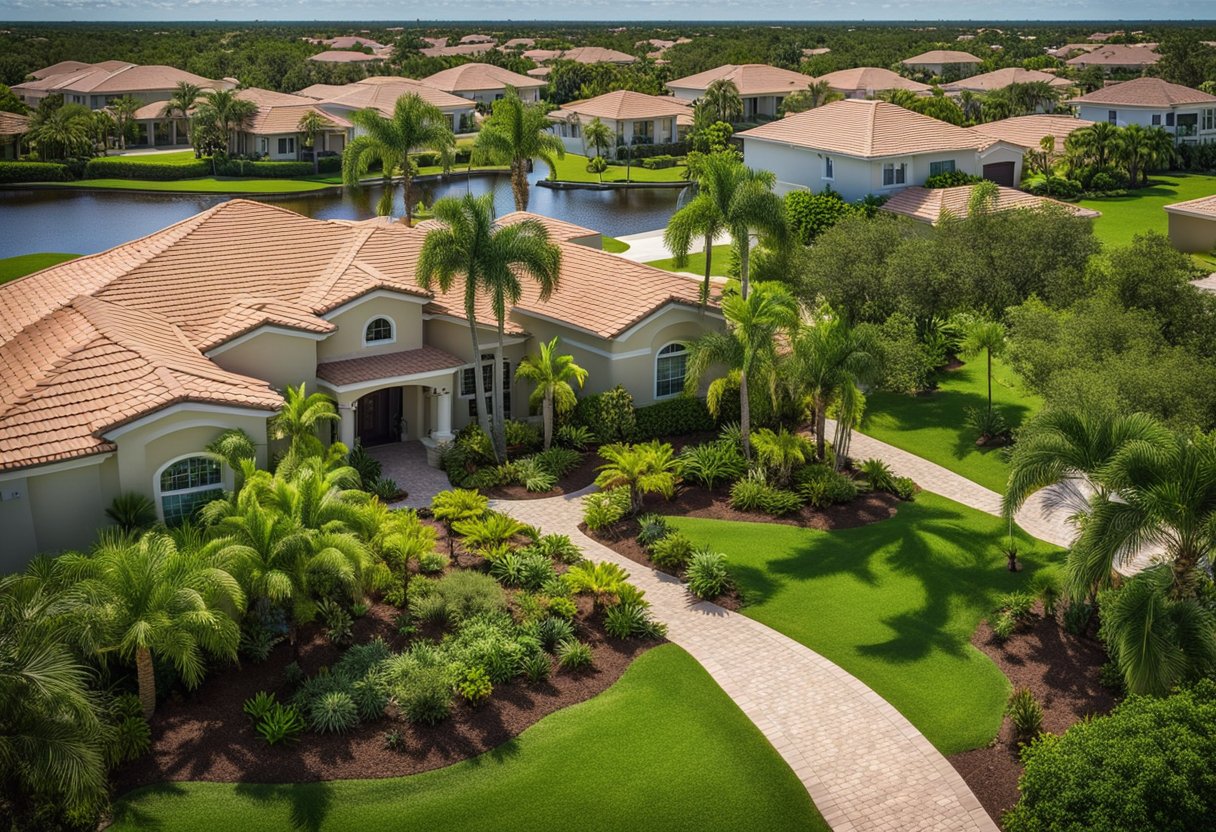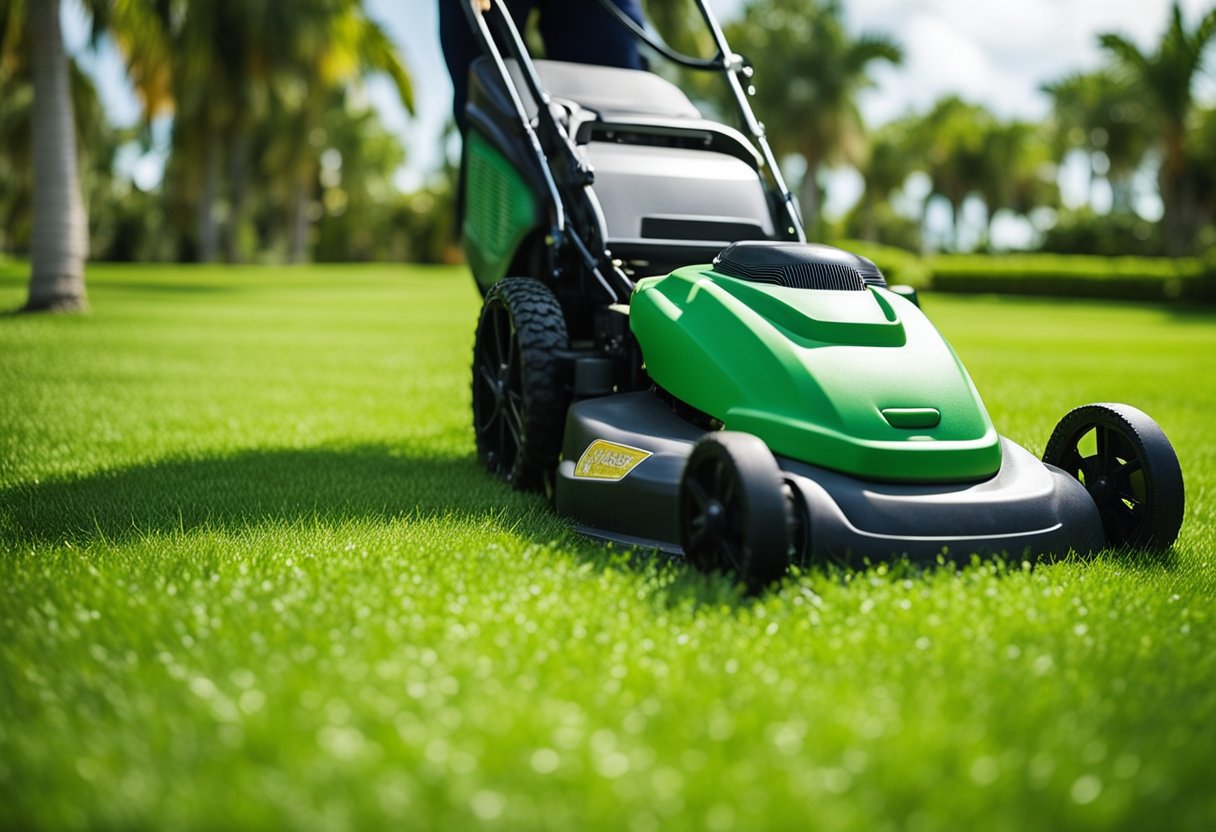Integrated Pest Management Overview
Integrated Pest Management (IPM) is a process that solves pest issues while minimizing risks to people and the environment. IPM is applicable for managing pests anywhere, including urban, agricultural, and natural areas.
One key aspect of IPM is Florida-Friendly Landscaping™, a science-based program that incorporates sustainable landscape practices. With a focus on nine principles, this approach aims to promote eco-friendly landscape management in Florida.
In the pest control industry, various methods contribute to effective IPM. These include:
- Prevention: Choosing pest-resistant plants and proper plant placement to prevent infestations.
- Monitoring: Regularly observing the landscape to detect the presence of pests.
- Identifying pests: Determining the specific pest species to apply targeted control measures.
- Mechanical control: Employing physical methods such as traps or barriers to control pests.
- Biological control: Introducing natural predators or parasites to reduce pest populations.
- Cultural control: Modifying environmental factors, such as irrigation or pruning, to discourage pests.
- Chemical control: The judicious use of pesticides, preferably low-toxicity and narrow-spectrum products.
By implementing IPM in both residential and commercial settings, Cape Coral’s pest control services can effectively manage outdoor pests, minimize environmental impact, and protect public health.
Biological Controls to Control Pests
Predators for Problem Insects
One effective method to manage outdoor pests in Cape Coral, Florida, is introducing natural predators. These predators feed on problem insects, reducing their population. For instance, use ladybugs to control aphids, as they devour these pests in large numbers. Additionally, green lacewings and spiders help keep harmful insect populations in check.
Parasites to Control Pests
Parasites are another form of biological pest control. They target specific pests without harming other species, making them a safe choice for Florida gardens. A common example is the parasitic wasp, which lays eggs inside caterpillars, ultimately killing them. The University of Florida’s Center for Landscape Conservation and Ecology states that parasitic nematodes can also be employed to control grubs, effectively reducing the damage caused to lawns and plants.
Examples of effective parasites:
- Parasitic wasps
- Trichogramma wasps
- Braconid wasps
Introducing Pest Competitors
Introducing competitors can help balance the ecosystem and reduce pest populations. These competitors limit access to food sources or breeding sites for targeted pests, reducing their chances of survival. An example is using decoy plants that attract pests away from valuable ornamental or food crops.
Physical Landscaping Controls to Keep Pests in Check

Mulching
In Cape Coral, mulching is a common and effective method to manage outdoor pests. Mulching involves applying a layer of organic material, such as bark chips or straw, on the soil surface. This practice not only conserves soil moisture and promotes plant growth but also helps to deter pests. The mulch creates a barrier that makes it difficult for insects to access the plants. Additionally, some types of mulch, like cedar, have a natural repellent effect against pests.
To make the most of mulching, apply a 2-4 inch layer, and keep it at least 3 inches away from plant stems. This prevents moisture buildup and discourages pests from nesting near the plants. For effective pest control, regularly inspect and refresh the mulch as needed.
Screens and Landscaping Fabric
Installing screens and landscaping fabric can help protect plants in Cape Coral from pest damage. Screens provide a physical barrier that prevents insects from reaching the plants. These can be customized to fit various plant sizes and allow air circulation, ensuring the plants stay healthy. Screens can be particularly useful for protecting valuable plants or those vulnerable to specific pests.
Landscaping fabric is a permeable material typically used to suppress weeds and improve soil health. It can also serve as a barrier against pests, like ants and moles, by denying them access to the soil. To use landscaping fabric effectively, lay it on the ground before planting, and make small cuts for plants to grow through. This creates a barrier without hindering plant growth.
Implementing physical landscaping controls like mulching, screens, and landscaping fabric, along with regular lawn maintenance can keep pests in check and maintain a healthy outdoor environment in Cape Coral.
Proper Watering of Your Property to Deter Pests
Watering Techniques
It’s best to water lawns in the early morning, between 4 a.m. and 8 a.m. This timing allows water to soak into the soil and be accessible to the roots while reducing the chances of waterborne pests. Watering in the mornings also prevents the evaporation that occurs during the heat of the day.
Homeowners should avoid overwatering. Lawns typically need 1 inch of water per week, but this can vary based on the season and type of grass. By using a rain gauge or even something so simple as an empty tunafish can (properly sanitized so as to not attract pests), tracking the amount of water applied each week becomes simple and accurate.
Regular, Proper Mowing Can Actually Help to Keep Pests in Check
A well-maintained lawn can help deter pests in your outdoor spaces. Proper mowing techniques and lawn control practices go a long way in minimizing issues related to pests. Here are some useful tips to keep your lawn healthy and pest-free.
First, set the right mowing height for your grass type. In general, longer grass blades (usually right around 3 inches or a bit more) promote deeper root growth, which creates a stronger and more resilient lawn. This helps prevent common lawn diseases that can attract pests. Each grass type has a specific height range, so make sure to follow the guidelines for your lawn.
Next, mow frequently but with caution. Removing more than one-third of the grass blade in a single session can stress your lawn, making it more susceptible to pests. Mow regularly, but ensure that you cut just the right amount to keep your lawn healthy – never more than ⅓ of the grass lengths.
Keep your mower blades sharp and clean. Dull blades can cause rough and uneven cuts, which can weaken the grass and invite pests. Additionally, maintaining clean mower blades helps prevent the transfer of unwanted diseases and pests to your lawn.
Other Lawn Maintenance Tips
- Aerate the lawn once a year to break up compacted soil, improve air circulation, and encourage deeper root growth.
- Apply organic fertilizers and pre-emergent weed control to enhance the overall lawn health and limit pest infestations.
Chemical Control as a Last Resort
When dealing with pests in Cape Coral, Florida, it’s crucial to explore safe and effective options. While many pest control services offer a variety of methods, chemical control should be the last resort. This approach involves using strong pesticides that can be harmful to humans, pets, and the environment.
Common Landscaping Pests in Cape Coral, Florida
In Cape Coral, Florida, various pests can harm outdoor landscapes. Some of these common pests include ants, roaches, and other invasive insects. Understanding these pests is crucial for maintaining a healthy and beautiful landscape.
Ants are a widespread problem in Cape Coral. They create unsightly mounds in lawns and gardens. These creatures may also damage roots and weaken plants. As ant colonies expand, they can make it difficult to maintain a garden by killing off vegetation.
Roaches are another issue that plagues outdoor spaces in Cape Coral. These pests carry bacteria and can transmit diseases. Roaches are attracted to moist, dark areas where they can breed and proliferate. It is essential to integrate proper drainage and maintenance practices in your outdoors to discourage roach infestations.
Frequently Asked Questions
How Can I Safely Control Pests in my Cape Coral Garden?
To safely control pests in your Cape Coral garden, choose non-toxic and eco-friendly methods. First, keep the garden clean. Clear away dead plants and debris as they can harbor pests. Next, use physical barriers, like netting and fences, to protect your plants. Lastly, try introducing beneficial insects like ladybugs and lacewings that prey on pests. These natural control methods safeguard the environment while keeping your garden pest-free.
What are Some of the More Effective Organic Pest Control Methods in Cape Coral?
Cape Coral residents can rely on the following effective organic pest control methods:
- Neem Oil: It acts as a repellent, preventing pests from feeding on your plants.
- Diatomaceous Earth: A powder that harms the exoskeletons of pests like ants and fleas, causing them to dehydrate and die.
- Bacillus thuringiensis (Bt): A soil-dwelling bacterium that kills pests like caterpillars when ingested, making it great for protecting your garden.
- Biological Control: Introducing predatory insects like ladybugs or predatory mites can help keep pests in check.
When is the Best Time of Year to Introduce Pest Control Techniques in Florida?
Florida’s warm climate makes it crucial to employ pest control techniques year-round. However, pests tend to be more abundant during the spring and summer months. As temperatures rise, pests like mosquitoes, ants, and flies become more active. Thus, it is vital to introduce pest control techniques at the end of winter or the start of spring to get ahead of the pest population boom. During the rest of the year, monitor and maintain your pest control methods to keep your garden and home protected.
Pest Control
Treatments to Keep Garden Pests like Japanese Beetles at Bay

DIY Yard Care
Check out our blog for information on how to do upkeep around your yard. Tips and tricks for keeping your lawn, plants and trees healthy.

Cape Coral Events Calendar
A monthly listing of the events for you and your family to enjoy in and around Cape Coral

COMPLETE LIST OF ALL SERVICES
All Services
Click a Link Below for More Information About Services Provided
Hardscaping
Curbing
Decks
Fence Maintenance & Install
Fire Pits
Landscape Lighting
Outdoor Kitchens
Patios
Pergolas & Gazebos
Retaining Walls
Walkways
Sprinkler Systems
General
Fall Cleanup-Leaf Removal
Landscape Design
Mulching
Organic Landscaping
Spring Cleanup
Water Features
Xeriscaping
Trees, Shrubs & Perennials
Flower Beds & Planters
Hedge & Shrub Trimming
Stump Grinding
Tree Planting
Tree Removal
Tree Trimming & Pruning
Lawn Maintenance
Lawn Aeration
Lawn Dethatching
Lawn Edging
Lawn Fertilization
Lawn Mowing
Pest Control
Weed Control
Drainage Issues
Sod & Turf
OUR SERVICE AREA
Serving Cape Coral and Surrounding Suburbs
The perfect Cape Coral landscaper for your needs.
For more information, click on your community below
LET’S GET STARTED
Contact Us
Cape Coral Landscaping Lynx
Phone:
239.946.2003
Email:
operations@capecorallandscapinglynx.com
Hours:
Sun – Sat: 8am – 6pm